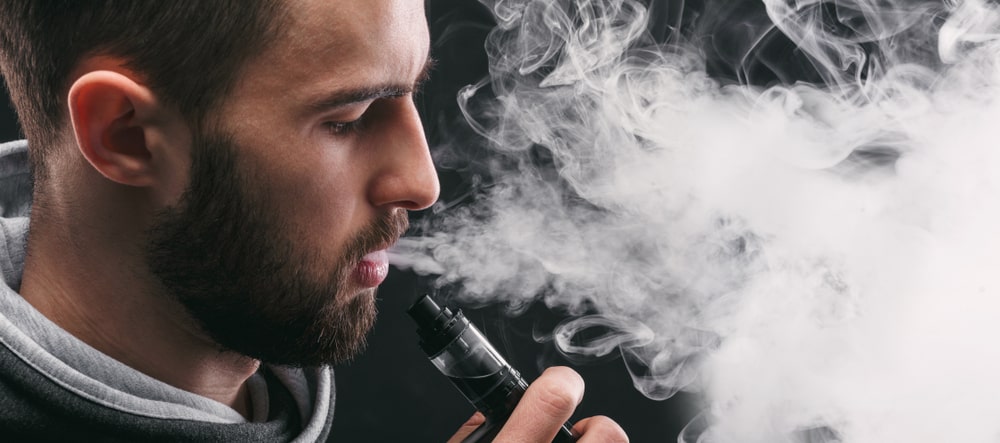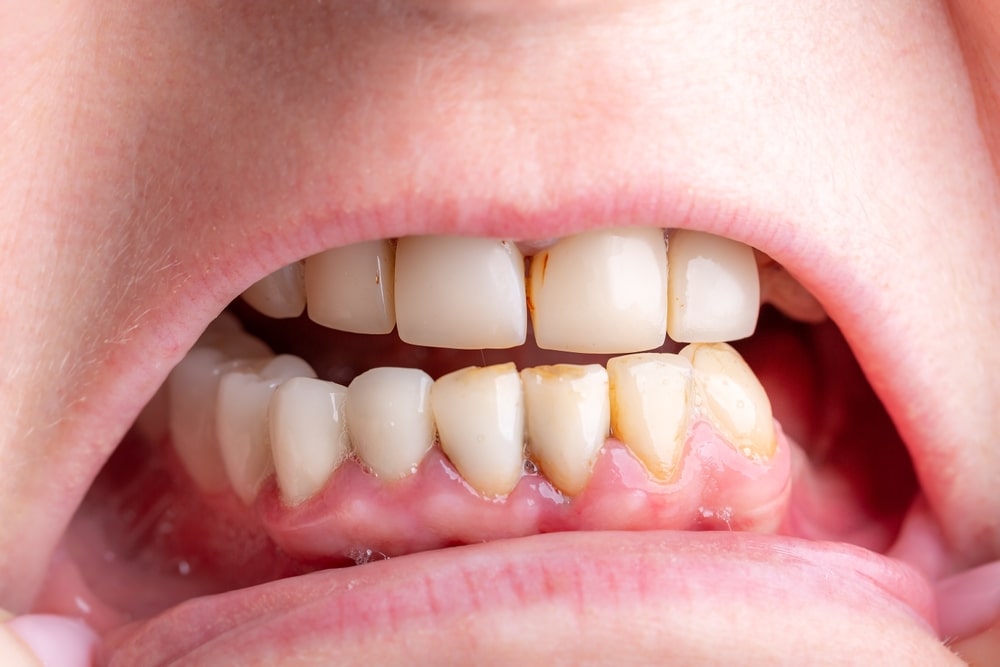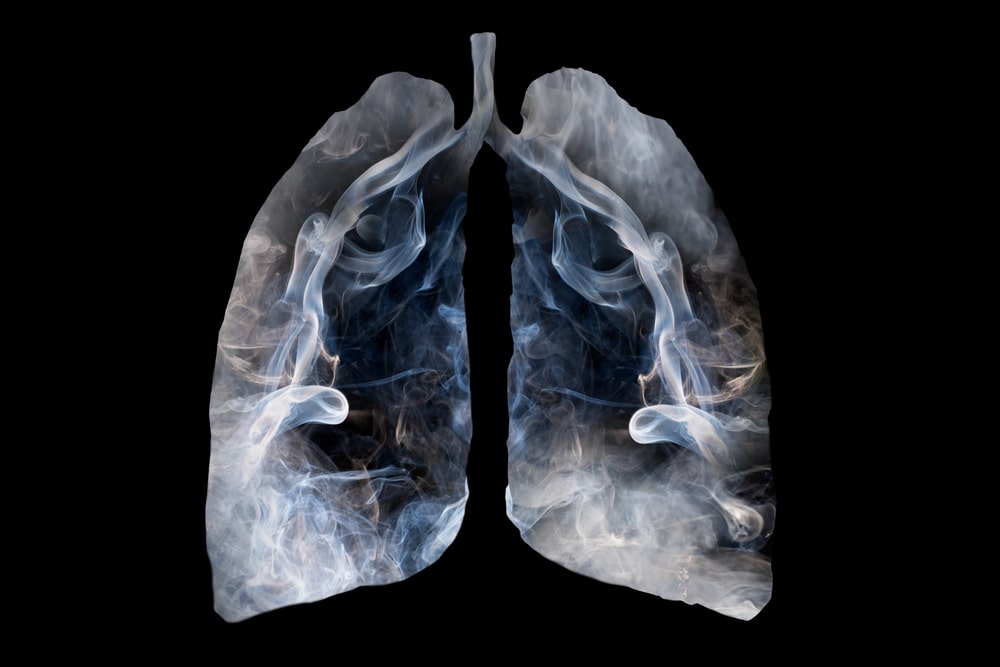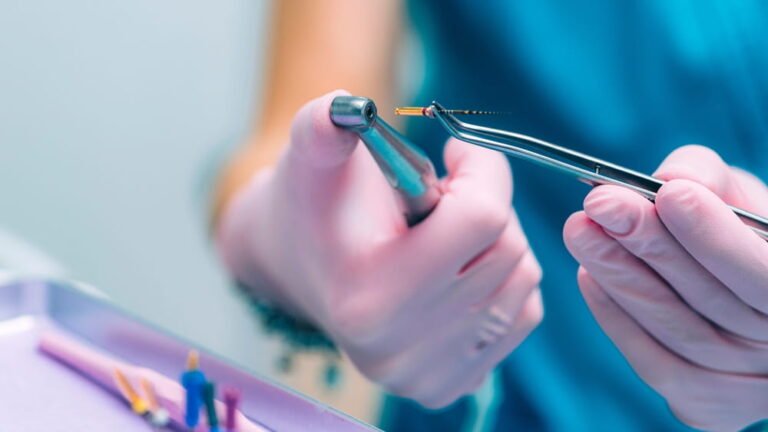You might have heard that vaping is a “safer alternative” to traditional cigarettes. It’s a common misconception, often presented with sleek designs and appealing flavors. But when it comes to your oral health, the truth is far more complex, and frankly, quite alarming. At White Tooth Dental, we believe that understanding the real risks is the first step toward a healthier you. Think of it this way: traditional cigarettes are like a wildfire, causing obvious and immediate destruction.
Vaping, however, is more like a slow, insidious corrosion, quietly eroding your oral health in ways you might not even realize until it’s too late. It’s not just about the lungs; your mouth is on the front lines, bearing the brunt of every puff.
What’s Really Happening When You Vape? The Oral Health Connection
When you vape, you’re not inhaling “vapor.” You’re inhaling an aerosol – a fine mist of tiny particles containing chemicals that are anything but harmless.
This aerosol, a cocktail of nicotine, flavorings, propylene glycol, vegetable glycerin, and sometimes even heavy metals, directly impacts your entire mouth.
While traditional tobacco has well-documented oral health risks, vaping introduces a unique set of challenges, some of which are even more aggressive in their onset.
The Silent Assailant: Dry Mouth (Xerostomia)
Have you ever felt your mouth unusually dry after vaping? You’re not imagining it.

This isn’t just a minor discomfort; it’s a significant red flag for your oral health.
The primary culprit here is propylene glycol (PG), a humectant found in most e-liquids.
Its job is to absorb moisture, and when inhaled, it pulls water from your saliva. This leads to xerostomia, or chronic dry mouth.
Why does this matter so much? Saliva is your mouth’s natural defense system. It washes away food particles, neutralizes acids, and contains minerals that protect your tooth enamel.
When saliva production drops:
- Cavities Skyrocket: Without saliva to clean and remineralize your teeth, harmful bacteria thrive, leading to rapid tooth decay. Studies suggest that cavities can appear much faster in vapers.
- Gum Disease Worsens: A dry environment irritates gum tissues, making them more susceptible to inflammation and infection.
- Bad Breath: Reduced saliva allows odor-causing bacteria to multiply unchecked.
- Difficulty Speaking and Swallowing: Severe dry mouth can make everyday functions uncomfortable.
Gums Under Attack: Inflammation, Bleeding, and Impaired Healing
Your gums are the foundation of your smile, and vaping puts them under immense stress.

Nicotine, a key component in most e-liquids, constricts blood vessels. This reduces blood flow to your gums, depriving them of vital oxygen and nutrients.
What you might not see is that this impaired blood flow can mask the typical signs of gum disease, like bleeding gums, making the problem seem less severe than it is.
However, beneath the surface, the damage is progressing rapidly.
Research from the American Dental Association highlights that vaping can lead to oral dysbiosis (an imbalance in your mouth’s natural bacteria) in as little as 6 to 12 months, compared to about 5 years for traditional smokers.
This swift bacterial shift creates a hostile environment, increasing your risk for:
- Gingivitis: Inflammation of the gums, causing redness, swelling, and easy bleeding.
- Periodontitis: If gingivitis goes untreated, it can progress to this severe form of gum disease, leading to bone loss around your teeth and eventually, tooth loss.
- Impaired Healing: If you need a dental procedure like a tooth extraction, a gum graft, or even just healing from a cut, vaping can significantly slow down the process and increase the risk of complications due to reduced blood flow and compromised immune response.
The Stain and Decay Double Whammy: Teeth Under Siege
While nicotine can contribute to tooth staining, it’s not the only culprit in vaping. Many e-liquids contain added sugars and acidic flavorings that coat your teeth.

This sticky, sugary film provides a feast for cavity-causing bacteria.
Think about it: a perpetually dry mouth combined with a constant supply of sugar and acid is the perfect recipe for cavities and enamel erosion.
This isn’t just about surface-level issues; it’s about the structural integrity of your teeth.
Beyond the Obvious: Oral Sores and Unseen Damage
Vaping can also cause a range of other concerning oral issues:
- Oral Sores and Lesions: The heat, chemicals, and mechanical irritation from vaping can cause sores, ulcers, and other lesions to develop inside your mouth.
- Atypical Candidiasis: Dry mouth and an altered oral microbiome can create an ideal environment for fungal infections, leading to oral thrush (candidiasis), which presents as white patches in your mouth.
- Bruxism (Teeth Grinding): Nicotine is a stimulant, and its use can be linked to increased anxiety and muscle tension, which might contribute to teeth grinding, especially at night. This can lead to worn-down teeth, jaw pain, and headaches.
The Lingering Question: Vaping and Oral Cancer Risk
This is perhaps the most concerning question for many.
While traditional tobacco is a known carcinogen, the long-term cancer risks of vaping are still being studied.

However, what we do know is concerning:
- Carcinogens in Aerosol: The aerosol from e-cigarettes is not “harmless water vapor.” It contains known carcinogens and toxic chemicals like formaldehyde, acetaldehyde, and acrolein, which can directly damage DNA and increase cancer risk.
- Flavoring Chemicals: Some flavoring agents, like diacetyl, are linked to severe lung disease, and their long-term oral effects are still under investigation but raise significant concerns.
- Heavy Metals: Heating coils in vape devices can release tiny metal particles (like nickel, lead, and chromium) into the aerosol, which can be inhaled and accumulate in the body, posing potential health risks, including cancer.
- Dual Use: Many individuals use both traditional cigarettes and e-cigarettes. This “dual use” significantly compounds the risks, often leading to even higher exposure to harmful chemicals than using either product alone.
The American Cancer Society emphasizes that while vaping might pose fewer immediate cancer risks than traditional smoking, it is certainly not risk-free.
The potential for future oral and systemic cancers due to chronic exposure to these chemicals is a significant public health concern.
“Can My Dentist Tell If I Vape?”
Yes, quite often, we can. During your regular check-ups, your dentist looks for specific clinical signs that are common in vapers:
- Unusual dryness in your mouth.
- Increased plaque and tartar buildup, especially around the gum line.
- Red, swollen, or unusually pale gums that might bleed easily (or surprisingly not bleed, due to nicotine’s masking effect).
- New or rapidly progressing cavities, particularly on surfaces not typically affected.
- Sores or white patches (candidiasis) in your mouth.
- Changes in the health of your tongue or other soft tissues.
- Gum recession or bone loss.
It’s important to be open with your dental team about your vaping habits.
This allows us to provide the most effective and personalized care, focusing on preventative measures and addressing specific issues promptly. We’re here to help, not to judge.
Your Path to a Healthier Smile: Quitting Vaping
The good news? Your mouth is incredibly resilient.
Many of the negative effects of vaping on oral health can begin to reverse once you stop.
Why Quit for Your Oral Health?
- Improved Saliva Flow: Within days or weeks, your salivary glands can begin to recover, increasing natural cleansing and protection.
- Healthier Gums: Blood flow to your gums improves rapidly, reducing inflammation and allowing tissues to heal. You might notice less bleeding and improved gum color.
- Reduced Cavity Risk: With better saliva production and no more sugary aerosol, your risk of new cavities drops significantly.
- Faster Healing: If you’re planning any dental procedures, quitting vaping beforehand can dramatically improve your healing time and reduce complications.
Steps to a Vaping-Free Mouth
Quitting vaping, especially with nicotine dependence, can be challenging, but it’s absolutely achievable.
Here are some strategies focused on regaining your oral health:
- Set a Quit Date: Make a commitment. Write it down.
- Identify Your Triggers: What makes you want to vape? Stress? Coffee? Certain places? Once you know your triggers, you can develop strategies to avoid or cope with them.
- Stay Hydrated: Drink plenty of water to help combat dry mouth symptoms while your salivary glands recover.
- Practice Excellent Oral Hygiene: Brush twice a day with fluoride toothpaste, floss daily, and consider an antibacterial mouthwash recommended by your dentist.
- Visit Your Dentist Regularly: Regular general services like check-ups and cleanings become even more critical during and after quitting. Your White Tooth Dental team can monitor your progress, address any lingering issues, and provide professional cleanings that remove stubborn stains and plaque.
- Seek Support: Don’t go it alone!
- Professional Help: Talk to your doctor or dentist. They can offer advice, resources, and even discuss nicotine replacement therapy (NRT) options if appropriate.
- Support Groups: Connect with others who are trying to quit.
- Quitting Hotlines/Websites: Many national and local resources offer free, confidential support.
The journey to a healthier smile is a marathon, not a sprint.
By understanding the unique risks of vaping and taking proactive steps to quit, you’re investing in a future of better oral health and overall well-being.
Frequently Asked Questions About Vaping and Oral Health
Is vaping really safer for my teeth than smoking?
While vaping avoids some of the tar and combustion byproducts of traditional smoking, it introduces its own set of unique risks, particularly dry mouth, increased cavity risk, gum inflammation, and exposure to harmful chemicals. It is not “safe” for your oral health.
What causes dry mouth from vaping?
The primary culprit is propylene glycol (PG), a common ingredient in e-liquids. PG is a humectant, meaning it absorbs moisture, leading to a significant reduction in saliva production.
Can vaping cause gum disease?
Yes, vaping can significantly contribute to gum disease. Nicotine constricts blood vessels, reducing blood flow to the gums and hindering their ability to fight infection. This, combined with changes in the oral microbiome, makes gums more susceptible to inflammation (gingivitis) and more severe forms of gum disease (periodontitis). Some studies show these changes can happen in as little as 6-12 months.
Do certain vape flavors or types cause more oral damage?
E-liquids with higher sugar content and more acidic flavorings (like citrus or candy flavors) can increase the risk of tooth decay and enamel erosion. While research is ongoing, some flavorings may also contribute more to inflammation or irritation.
Can my teeth heal after I stop vaping?
Yes, your mouth has a remarkable ability to heal! Once you stop vaping, blood flow to your gums improves rapidly, and saliva production can increase, helping your mouth naturally cleanse and protect itself. Gums can become healthier, and the risk of new cavities decreases. However, existing damage (like cavities or significant gum recession) will still require professional restorative dentistry or cosmetic dentistry from your dentist.
How does vaping affect dental procedures like extractions or implants?
Vaping significantly impairs your body’s ability to heal due to reduced blood flow and compromised immune response. This can lead to slower healing after extractions, increased risk of infection, and a higher chance of complications, including failure of dental implants. It’s highly recommended to stop vaping before and after any oral surgical procedure.
What should I do if I’m experiencing oral health issues from vaping?
The first step is to schedule an appointment with your dentist. Be open about your vaping habits. They can assess the damage, provide thorough cleanings, offer treatments for specific issues like dry mouth or gum inflammation, and discuss strategies to help you quit. Your White Tooth Dental team is here to support your journey to better health. We offer comprehensive general services as well as emergency dentistry if you’re experiencing acute pain or issues.
Your Oral Health Journey Starts Here
Understanding the risks is the first step, and taking action is the next.
At White Tooth Dental in Toronto’s Bloor West Village, we’re dedicated to helping our community achieve optimal oral health through education, prevention, and comprehensive care.
Whether you’re considering quitting vaping, have questions about its effects, or need help addressing specific oral health concerns, our compassionate team, led by Dr. Kristina Pahuta, is here for you.
We encourage you to explore our website to learn more about our services and how we can support your holistic oral health journey. Your healthiest smile is within reach.



